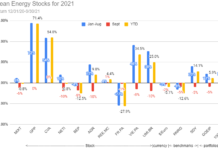The 2019 proposed US Renewable Fuel Standard proposed volumes attracted a major raspberry from the ethanol industry.
 As the American Coalition for Ethanol noted:
As the American Coalition for Ethanol noted:
“Unfortunately, EPA continues to take actions which undermine the letter and spirit of the statute and harm the rural economy. While refiners are reporting double-digit profits, the heart of America is being left behind. Farmers are losing money while refiners have the best of both worlds: fat profit margins and minimal RFS compliance costs. EPA needs to discard its refiner-win-at-all-costs mentality and get the RFS back on track.”
“While the proposed rule purports to maintain the 15-billion-gallon conventional blending target for the 2019 RVO, nearly 50 Small Refinery Exemptions (SREs) will reduce ethanol blending far below 15 billion gallons. Known exemptions for 2016 and 2017 have resulted in at least 2.25 billion in demand destruction for U.S. ethanol. These so-called ‘hardship’ waivers flood the market with RINs which refiners can bank, thereby artificially inflating the size of the RIN carryover to more than 3 billion gallons. As a result, D6 RIN prices have cratered. One year ago, D6 RINs were fetching approximately 90 cents but SREs have sunk those prices to about 20 cents today, nearly an 80 percent collapse. This, consequently, has reduced the incentive to blend ethanol with gasoline.”
In its submitted remarks, ACE commented on how EPA exemptions and waivers are harming rural America and violate statutory authority, the need for reallocation of Small Refinery Exemptions (SREs) and for EPA to comply with the Americans for Clean Energy et al v. EPA lawsuit, conventional, cellulosic, and advanced biofuel levels, RIN market operations, the need to issue a rulemaking extending the Reid Vapor Pressure (RVP) relief to blends above E10, encouraging EPA to adopt the latest GREET model with respect to the lifecycle analysis of corn ethanol.
But on the other side, the renewable natural gas sector was happy
The Coalition for Renewable Natural Gas (RNG Coalition), Energy Vision, National Waste and Recycling Association (NWRA), Natural Gas Vehicles for America (NGVAmerica), and Solid Waste Association of North America (SWANA) submitted joint comments on August 17 to the U.S. Environmental Protection Agency (EPA) on proposed 2019 Renewable Fuel Volume Obligations (RVO) under the federal Renewable Fuel Standard (RFS).
“The Renewable Natural Gas (RNG) industry is leading the way in the delivery of cellulosic biofuel in the United States, making up over 95 percent of our nation’s cellulosic biofuel production and generation of D3 Renewable Identification Numbers under the RFS,” said RNG Coalition CEO Johannes Escudero. “Our comments are supportive of EPA’s proposal to increase the 2019 minimum applicable volume for both cellulosic and advanced biofuels from 2018 to reflect the continued growth and investments being made in the RNG industry.”
The RFS program has successfully promoted production of renewable natural gas. Since 2011, the RNG industry has developed over 45 new facilities currently producing cellulosic biofuel, and there are currently more than 50 additional projects under construction or development. The industry’s cellulosic biofuel production has increased from approximately 33 million gallons in 2014 to over 240 million gallons in 2017.
“RNG investors and developers require certainty and stability to build new production facilities to expand production,” said David Biderman, SWANA Executive Director and CEO. “We appreciate the signal of stability from EPA in its use of consistency to project available cellulosic biofuel for 2019 in the proposal.”
Jim Lane is editor and publisher of Biofuels Digest where this article was originally published. Biofuels Digest is the most widely read Biofuels daily read by 14,000+ organizations. Subscribe here.









“Dont mess with the R.F.S.” Guess you should have read the R.F.S.?